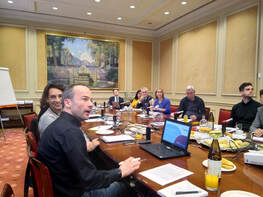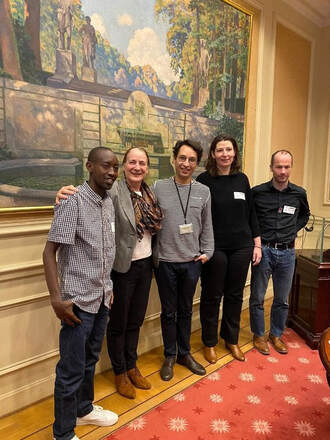 World Aids Day Seminar in the Belgian Senate. Copyright Sensoa.
World Aids Day Seminar in the Belgian Senate. Copyright Sensoa. For World Aids Day, the ‘Parliamentarians for the 2030 Agenda’ invited UNAIDS Brussels Representative Dr. Jantine Jacobi, Burundian youth representative Fabien Ndikuriyo, Stéphanie Drèze of MSF and Dr. Gert Scheerder of Sensoa to discuss the HIV epidemic worldwide, in Belgium and in Belgium’s partner countries.
 Fabien Ndikuriyo, Jantine Jacobi, Fourat Ben Chikha, Stéphanie Drèze and Gert Scheerder. Copyright Sensoa.
Fabien Ndikuriyo, Jantine Jacobi, Fourat Ben Chikha, Stéphanie Drèze and Gert Scheerder. Copyright Sensoa. Power to the People
With 1.7 newly infected HIV patients each year, UNAIDS’ latest report shows a severe lack of progress in HIV prevention. A substantial number of new infections can be found in Eastern Europe and Central Asia (29%), as well as in the Middle East and North Africa (10%). On top of that, the report also shows that too many HIV patients don’t know their seropositive status. Inequalities are at the basis of these statistics: gender inequality, stigma and discrimination, criminalisation of HIV and legislation with regard to consent around testing and treatment, pose serious barriers in the continued uptake of HIV and AIDS Community-led action is key to creating awareness and addressing these social injustices. However, the overall political climate for community engagement and action is becoming less and less hospitable. This ‘shrinking space’ for civil society, combined with decreased HIV and health funds for civil society entities, is why UNAIDS entitled its 2019 report ‘Power to the People’. Because the empowerment of the people and their communities plays a vital role in the prevention and uptake of HIV.
Fabien Ndikuriyo is an advocate for his peers in Burundi
Fabien Ndikuriyo, co-founder of the National Network of Young People Living with HIV in Burundi is one of those community activists. He has lived with HIV throughout his youth and is now taking on their plight. He knows the particular difficulties young people with HIV face first-hand. Many are orphans, sometimes excluded by their families. Access to higher education is difficult due to the high costs in Burundi. They face discrimination and lack trustful and confidential health service providers who respect their privacy. On top of that, the lack of information and comprehensive sexuality education makes prevention amongst young people challenging. In other words, there is a serious need to invest in young people’s SRHR. Fabien asked the MPs: ‘How can we explain to young people today that we could not prevent them from becoming infected, when the knowledge and medication are available’?
Belgium’s role vis-à-vis its partner countries
These same challenges regarding HIV prevention and treatment are found in other Belgian partner countries too. Stéphanie Drèze of MSF described the enormous financing gap in the HIV-response, with countries who are unable to bear the transition to domestic financing and where the out-of-pocket costs for health care remain high. Due to dwindling international financial support, countries run into stock outs which leads to interruptions in the treatments, which in turn can lead people to develop resistance to the life-saving drugs. Countries find themselves forced to give treatment priority over preventative measures and local civil society organisations lack the financial support that would allow them to monitor, to take on their part in the service provision and to advocate for people’s rights. In a country such as Guinea-Conakry, MSF takes on the care of 1 out of 4 people being treated. And in Guinea, as in other African countries, there is a co-morbidity of AIDS and TBC, with the prices of TBC testing and medicine still being unacceptably high. It is no surprise that MSF has asked Belgium to help ensure people’s access to treatment and help guarantee the continuity of care. They are also looking at Belgium’s support in negotiating the prices of tests and medication.
What about the needs of people living with HIV in Belgium?
Gert Scheerder, researcher at Sensoa presented the findings of the first ever needs assessment among people living with HIV in Belgium (in Brussels and Flanders). The study showed that stigma remains the biggest problem combined with continued discrimination, including by medical staff in Belgium. People living with HIV are also more at risk when it comes to mental health issues, and single people living with HIV as well as people living with HIV in Sub-Saharan Africa tend to enjoy little social support. Sensoa is invested in anti-stigma campaigns and is currently piloting projects with hospitals in Antwerp to prevent future discrimination of people living with HIV.
To summarise, the HIV epidemic is far from over and will require continued efforts on all fronts, from access to treatment and removal of stigma, in all affected communities and by all governments.
With 1.7 newly infected HIV patients each year, UNAIDS’ latest report shows a severe lack of progress in HIV prevention. A substantial number of new infections can be found in Eastern Europe and Central Asia (29%), as well as in the Middle East and North Africa (10%). On top of that, the report also shows that too many HIV patients don’t know their seropositive status. Inequalities are at the basis of these statistics: gender inequality, stigma and discrimination, criminalisation of HIV and legislation with regard to consent around testing and treatment, pose serious barriers in the continued uptake of HIV and AIDS Community-led action is key to creating awareness and addressing these social injustices. However, the overall political climate for community engagement and action is becoming less and less hospitable. This ‘shrinking space’ for civil society, combined with decreased HIV and health funds for civil society entities, is why UNAIDS entitled its 2019 report ‘Power to the People’. Because the empowerment of the people and their communities plays a vital role in the prevention and uptake of HIV.
Fabien Ndikuriyo is an advocate for his peers in Burundi
Fabien Ndikuriyo, co-founder of the National Network of Young People Living with HIV in Burundi is one of those community activists. He has lived with HIV throughout his youth and is now taking on their plight. He knows the particular difficulties young people with HIV face first-hand. Many are orphans, sometimes excluded by their families. Access to higher education is difficult due to the high costs in Burundi. They face discrimination and lack trustful and confidential health service providers who respect their privacy. On top of that, the lack of information and comprehensive sexuality education makes prevention amongst young people challenging. In other words, there is a serious need to invest in young people’s SRHR. Fabien asked the MPs: ‘How can we explain to young people today that we could not prevent them from becoming infected, when the knowledge and medication are available’?
Belgium’s role vis-à-vis its partner countries
These same challenges regarding HIV prevention and treatment are found in other Belgian partner countries too. Stéphanie Drèze of MSF described the enormous financing gap in the HIV-response, with countries who are unable to bear the transition to domestic financing and where the out-of-pocket costs for health care remain high. Due to dwindling international financial support, countries run into stock outs which leads to interruptions in the treatments, which in turn can lead people to develop resistance to the life-saving drugs. Countries find themselves forced to give treatment priority over preventative measures and local civil society organisations lack the financial support that would allow them to monitor, to take on their part in the service provision and to advocate for people’s rights. In a country such as Guinea-Conakry, MSF takes on the care of 1 out of 4 people being treated. And in Guinea, as in other African countries, there is a co-morbidity of AIDS and TBC, with the prices of TBC testing and medicine still being unacceptably high. It is no surprise that MSF has asked Belgium to help ensure people’s access to treatment and help guarantee the continuity of care. They are also looking at Belgium’s support in negotiating the prices of tests and medication.
What about the needs of people living with HIV in Belgium?
Gert Scheerder, researcher at Sensoa presented the findings of the first ever needs assessment among people living with HIV in Belgium (in Brussels and Flanders). The study showed that stigma remains the biggest problem combined with continued discrimination, including by medical staff in Belgium. People living with HIV are also more at risk when it comes to mental health issues, and single people living with HIV as well as people living with HIV in Sub-Saharan Africa tend to enjoy little social support. Sensoa is invested in anti-stigma campaigns and is currently piloting projects with hospitals in Antwerp to prevent future discrimination of people living with HIV.
To summarise, the HIV epidemic is far from over and will require continued efforts on all fronts, from access to treatment and removal of stigma, in all affected communities and by all governments.

 RSS Feed
RSS Feed